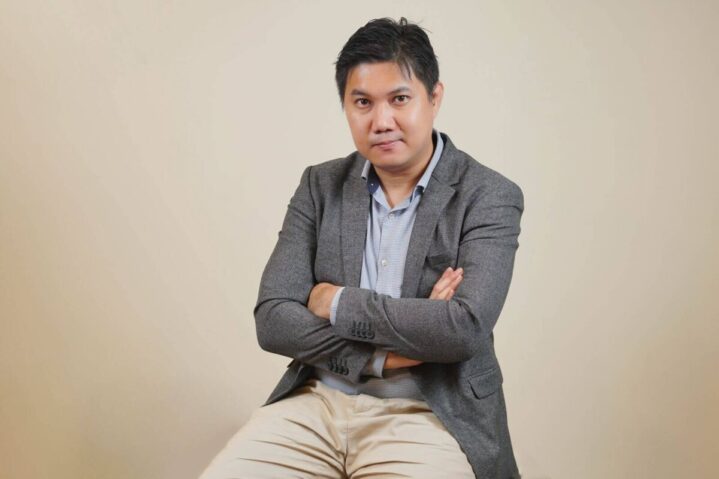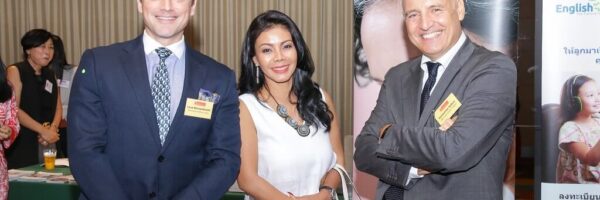
For Gladwin Pantastico, running a classical music school in Phuket is a fulfilment
Born and raised in the Philippines, Gladwin Pantastico, 40, was surrounded by musicians in his family. Yet, he discovered his love of classical music at just 12 years old. By the time he was doing his music degree in a Filipino conservatory, he had taught classical music for five years in several schools in the Philippines.
Aged 22, when the classical music sector was still evolving in his home country, he realised that making a living out of it was a tough nut to crack. Keen to explore his boundaries, he ventured into the wide world and took his first overseas job offer in the Maldives, where he performed classical music for seven years.
But after some time, staying in the entertainment industry felt like a dead end to him; he wanted to “go back more academic,” and moved to Singapore, where he taught classical music for almost ten years. In 2013, he was designated as general manager of a music school in Singapore and led a team of internationally acclaimed music teachers.
Visiting friends in Phuket, he noticed the lack of music education on Thailand’s largest island – and that was the start of his lifelong journey in a destination better known for beaches, parties, and tourist life.
His profile offers insight into the different approach to education and child development, the challenges of relocating, and ultimately, setting up a business in Thailand.
Why did you start a music school in Phuket?
“I recognised many children had a talent for music, but there weren’t enough music schools. I thought it was important to introduce western classical music to the young generation and enhance the quality of classical music education with qualified teachers from abroad.”
Gladwin set up his licensed “Phuket School of Music” in 2018 with his Thai partner. His school – registered with the Ministry of Education – has lived to tell the tale and grown despite Covid-19. He believes that foreign teachers and quality instruments are critical to his school’s success.
“It’s imperative to provide high quality instruments to the students because the very foundation for them is to train with responsive and tone sensitive instruments, allowing them to express themselves in performing. We offer programmes for the violin, piano, classical guitar, clarinet, saxophone, singing, and flute, immersing learners in the art of western classical music.”
Phuket School of Music boasts a 70 seat recital studio equipped with a Steinway designed Boston GP178 Performance Edition II, and music rooms furnished with Essex upright pianos by Steinway & Sons, enabling students to learn and perform with superior instruments.
“Speaking of quality instruments, I can safely say that about 95% of major concert halls worldwide use Steinway & Sons, and many institutions prefer to use Steinway designed pianos for their students. Steinway has become the preference of many great musicians.
His enthusiasm is palpable. He stands up, and strokes the grand piano affectionately. “The beauty of this piano is – we always think a piano is the key; that you get the sound you need. But in fact, the piano changes. When you play it softly, it sounds very sweet. When you play it harder, it responds to you. This grand piano can be fierce and bright, like the chiming of a bell. It’s a privilege for a pianist to know how to play a quality instrument,” he raves.
He says it allows the performer to express music with ultimate control of tone, dynamics, and articulation. “The response is very sensitive.”

Are most of your students children?
“We have lots of young kids aged five to twelve, and there are a couple of teenagers and adults. There are no boundaries; we also teach three year olds.”
Even if a 70 year old signed up, he would accept them. “Music has no age limit; you can learn it at any point in life. But the best age to learn music is usually from age six to nine, so we encourage this generation to take the chance.”
Learning to play an instrument, Gladwin says, is like learning a language. “When you learn it at a young age, it stays with you as you get older.”
Children grow in the school over the years. “And especially nowadays” – he pauses, takes a deep breath – “it’s becoming more competitive; youngsters are getting more into music. Many kids are taking up music at an early age. It’s a privilege. I started late; I was twelve. They begin at four.”
His father wanted Gladwin to pursue music and have his studio in the Philippines. “He wanted one part of the house to be a music studio, something like that,” he says and laughs heartily. But he never forced him; musical family members surrounded Gladwin. His uncle and cousins were all doing something with music. Eager to gain experience in different countries, he left the Philippines. He believes he learned from that.
For Gladwin, classical music is a lifestyle. “I want to make sure every student who learns here – it’s not just about learning to play a particular instrument – that we also build their character towards music, especially that of young kids.”
He wants the kids to lead the lifestyle of a musician. “It’s not just about the one hour per week that they’re here. When the students go home, it’s important for them to surround themselves with music. Whether it’s listening to music or talking about it, music has to be part of their lives. If they don’t do anything with music in their free time, it can be challenging for them to cope with their lessons. It has to be planted into their lifestyle. And that’s what we teach them.”
Has any of your students made it big?
“Some have joined competitions where they won first, second, and third prizes, but we are still a young school. We encourage kids to set their goals, whether for a performance or music exam – which we offer under the ABRSM – the Associated Board of the Royal Schools of Music, a UK based examination board. And of course, the ABRSM is an excellent programme for all ages. When someone wants to get into university to develop music further, we set a strong foundation for them and help them prepare for auditions.”
What were the biggest challenges of setting up a music business in Thailand?
“I had to make sure moving here was feasible. Was the potential for a music business big enough? I noticed many expatriates want their kids to study at international schools in Phuket. There are also many local schools for sure. I realised every family wants their child to do something with music. And with this population that we have here in Phuket, I saw there was an opportunity.”
Scouting the area for a location, he found this place near Central Festival. “I felt it was the perfect location for the school. Having to start a school from scratch, with zero students, zero teachers, was demanding.”
“Business in Thailand” – he takes a deep breath – “to be honest, it’s a lot of paperwork. And to get to the right people who can show you how it’s done is a challenge.”
He explains you have to know how to develop a curriculum and submit it to the Ministry of Education, which needs to approve it. The school had to be licensed with his concept of employing expat teachers who need visas and work permits. “And qualified music teachers have to earn a decent income to sustain themselves here. We have to balance sustainable rates for the school and keeping them affordable for people.”
Another challenge is the language barrier. Some students aren’t able to communicate well in English, but they understand, somehow. And he has staff that helps him translate in the classes. But if a Thai doesn’t understand English at all, it isn’t child’s play. Some parents deliberately expose their children to this environment, so they learn English in the bargain.
“Interestingly, it works for many students. Music is a language,” Gladwin says and laughs in a relieved manner.
Each kid responds differently in music, and creating individual solutions isn’t always easy. Some students have longer lessons, one hour or two hours per week, and if they’re preparing for an examination, concert, or any performance, even longer.
What was settling in like?
“I had to find a room, which is difficult if you don’t speak Thai. I was in Singapore for a long time; moving here after living in a fully developed city was a significant change.” He reflects. “Public transport is not as convenient here as in Singapore, Hong Kong, Bangkok, or Manila, where you have the skytrain or subway. You got to have your own car. Other than that, you get everything you need. It’s very liveable.”
When Gladwin moved to Phuket, he always ate at food courts. Big C, Central Festival. Then he discovered eateries like Gluay Nam Wa, a restaurant in Phuket town’s Samkong area. He prefers local dishes now and always eats out as he enjoys the variety of dining options in Phuket. “I stopped going to the malls after a year. You can eat at different places every day for a month and still find new meals and restaurants.”
He thinks Phuket town is a mini city and appreciates the excellent balance in life the island offers. There are many world class hotels, beautiful beaches, and friendly Thais. To be in the centre of the island helped him a lot as it gave him a sense of Phuket’s local lifestyle.
What advice can you give to anyone wanting to move to Thailand, and Phuket in particular?
“It depends on what you want to do. You need to understand the culture, locals, and their lifestyle. How they tick and do things here might be very different from the way they handle things in your country. Many unexpected things might happen.”
He explains that if you want to settle in Phuket as a business person, you need to know the market and blend in.
Gladwin stresses it’s essential to follow your passion. When he moved to Phuket, people were skeptical about a classical music school on the island. “They were like, ‘There’s no market here for a classical concert.’” Gladwin ignored them and organised concerts in 2018 and 2019, and they were sold out.
“Before relocating, I was fully aware that the vast majority of companies targeted tourists. Phuket is and will always be a tourism hotspot. But I am not into that business.” He laughs convincingly and says there are many opportunities. “If you want your project to last, do what you love.”

Are you living your dream?
“Doing something that you love is a dream. But of course, we always try to expand our boundaries; life is an endless journey. For me, helping students grow and seeing them succeed is a dream. It’s a dream come true for them and for us.”
But rather than Holy Grail, for Gladwin, seeing the kids perform well in a concert and achieve high grades “is not just a dream, it’s a fulfilment.”







